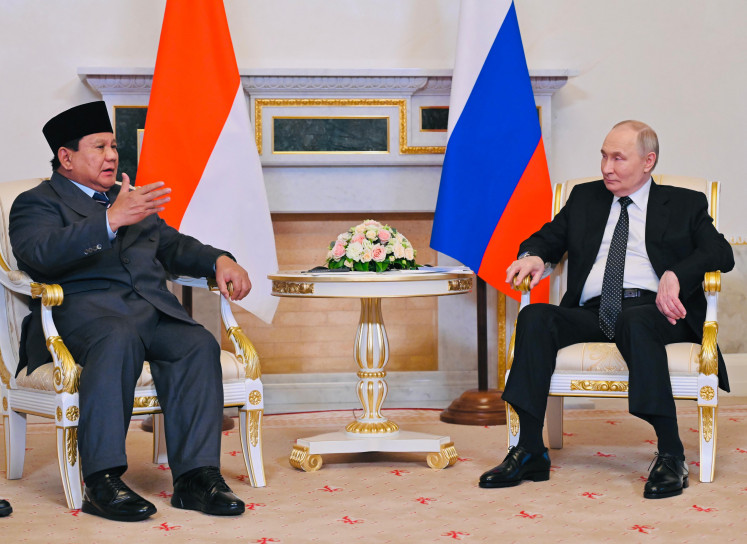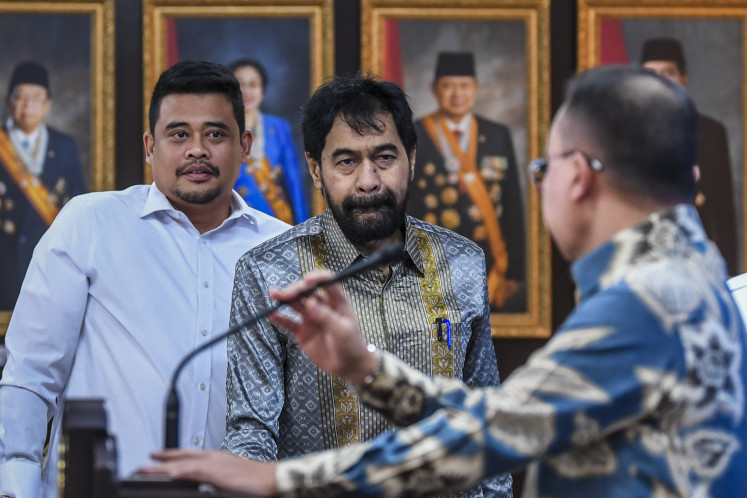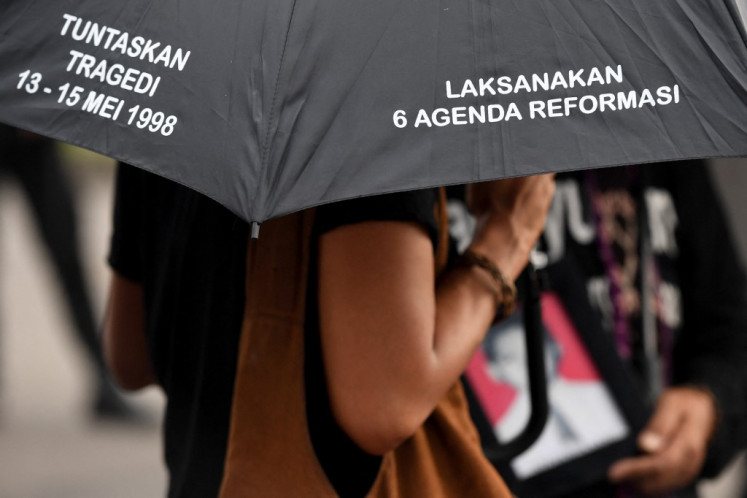Popular Reads
Top Results
Can't find what you're looking for?
View all search resultsPopular Reads
Top Results
Can't find what you're looking for?
View all search resultsA Trash Bank for public empowerment & a clean environmen
Trash-for-cash: A BSM customer leaves the bankâs headquarters after completing a trash-for-cash transaction
Change text size
Gift Premium Articles
to Anyone

Trash-for-cash: A BSM customer leaves the bank's headquarters after completing a trash-for-cash transaction.
As heat from the morning sun begins to radiate through the city located at an altitude of some 440 meters above sea level, a number of women and elders are packing used articles and trash in plastic bags and sacks in their house yards. At about 8:30 a.m., they take the packs by motorcycle and pushcart to a resident's house for weighing.
This vignette is a glimpse of waste handling activities in a trash bank unit in Malang, East Java. The Malang Trash Bank (BSM) is a cooperative set up in 2011 with its head office on Jl. S. Supriyadi. It also serves as the center of trash collection and management with a display room and banking system, receiving 3 tons of dry or inorganic rubbish daily.
BSM members comprise community groups, school groups and individuals. Unit members, groups or individuals, gather and sort trash from their homes. Groups under community units (RW) or neighborhood units (RT) deliver their trash to unit executives for weighing. Individual members send their trash directly to the central BSM.
Trash delivery time is based on consensus for groups and on trash availability for individuals, normally once in a month on average. Group trash is collected by dump trucks and taken to the central BSM for further sorting, packing and weighing by warehouse workers.
Weight notes are sent to the trash bank for calculation and inclusion in unit or individual savings books.
'The BSM has made me accustomed to taking care of rubbish by separating dry garbage from wet garbage to be gathered, which proves to produce economic and environmental benefits,' 45-year-old community group member Trilaman said.
Inorganic trash from households is grouped by the BSM into 70 types. Members who strictly sort their rubbish according to the categories can earn a lot more for their trash.
'The bank applies a transparent pricing system for members to avoid price manipulation and its operation is handled by local youths,' said Kamala, a BSM executive. The trash from members after being sorted in warehouses is placed in collection rooms as indicated by their categories.
Used plastic beverage bottles are directly processed into plastic chips after being separated from their labels and caps and grouped into their colors. Used plastic bags, paper, iron and bottle caps will be packed and sent to factories in Malang and Surabaya. Some of the processed plastic bags will return in the form of plastic sheets to the BSM for handicraft making.
Plastic packaging for food, soap, detergent, shampoo and coffee among others is also be recycled into various products such as umbrellas, handbags, hats, tissue holders and brooches. 'I've been a BSM member for two years and received skills training in handicraft making with recycled materials, so I can now sell my products online,' said a crafter, Nur Afia.

Not all BSM savings can be disbursed freely. Especially for group members, some of their money is to be spent on environmental development around their units such as park construction or tree planting. Additionally, their savings can be exchanged for basic necessities, electricity bill payments and health insurance, for at least a month after trash savings are made.
So far, only inorganic waste is handled by the BSM, leaving wet garbage to the Supit Urang sanitary landfill as the trash bank's land area is too small for a worm breeding and compost making site.
'The volume of trash handled by BSM is indeed smaller than that handled by the Supit Urang landfill but it is an adequate solution to the problem of inorganic waste,' said Teguh Sembodo, Head the BSM Operation Division.
It is hoped that efforts such as this will indirectly and gradually shape the mindset of local citizens so that they avoid dumping waste carelessly. In this way, residents will mutually assist each other to better manage household rubbish in order to create a clean and healthy urban environment.


' Photos by JP/Aman Rochman








